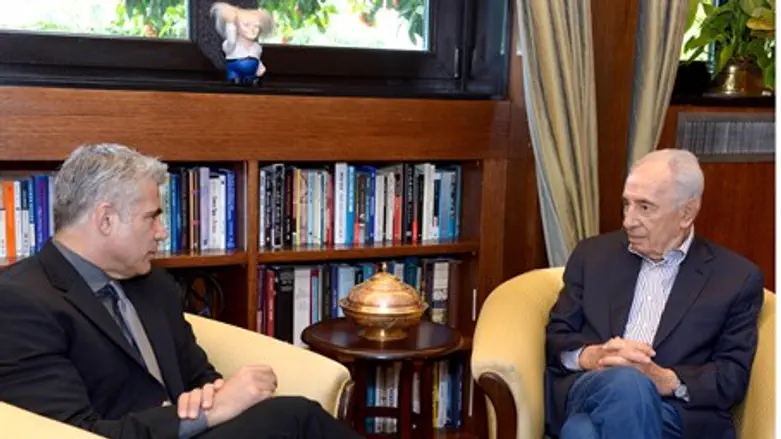
President Shimon Peres met on Monday morning with Finance Minister Yair Lapid to discuss the latter's thoughts about the impending vote in the Knesset on the the enlistment bill, which will see hareidi yeshiva students become eligible for the draft for the first time in Israel’s history. In the meeting, Peres expressed his concern for the hareidi community's feelings on the matter telling Lapid that he should go “a bit easier” on them.
According to Peres, many members of the community have complained to him about what they perceive as a negative attitude towards them and their lifestyle on Lapid's part. “As President it is my responsibility to meet with and listen to all sides on this matter,” Peres said.
While it was important to ensure that all Israelis served the country, Peres said that the process of bringing hareidi youth into the IDF must be done in a manner that does not alienate them. One thing Lapid could do to make things easier, Peres said, was to stop using the term “criminal” in relation to those who did not serve. “I met with many members of the community who are very hurt at the prospect that they will be regarded as 'criminals' if they do not serve,” Peres.
Lapid's attempts to include criminal penalties – including possible jail time – for hareidi students who resist serving had caused a great deal of tension in the community, Peres told him. “You have a great responsibility here, to correct a historic wrong,” Peres said. “You must find the right way to reach ideal of equal service,” but criminalizing resistance to being drafted by a population that historically did not serve in the army was not the way to do it, he added.
For his part, Lapid told Peres, he had nothing against the hareidi community. “The plan is to ensure equality of service, and to enable large numbers of the hareidi youth to work,” Lapid said. “In contrast to all the rumors and stories, this is not an anti-hareidi project, but honors them and those who study Torah, which I approve of. We must preserve the study of Torah, and this is part of what we are trying to do.”
However, he said, he stands by the idea of imposing criminal penalties. “The state must make some tough decisions,” Lapid said. “There are rights and obligations on our ladder of values, and all citizens have the same rights and obligations. No one is exempt, and that includes being exempt from the law. It is very important to me that you, the President, will understand this point, so we can continue on this path in a united manner,” he told Peres.
